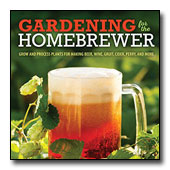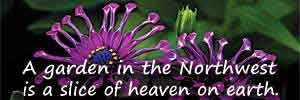Complete Organic Fertilizer
Forum Archives
Location: Olympic Peninsula
Posted: Jul-13-2004 at 8:28am
Well..it finally happened.........the only place in town that carries the cottonseed meal.....is out! Im trying my best to talk them into reordering, but it looks grim. I really dont want to have to go to Olympia to get it, but if need be, I guess......
As a substitution, I bought a bag of alfalpha
My question is...because of the lower nitrogen percentage, can I supplement just the nitrogen by adding an amount of bloodmeal??..say.......1/2 part? The bloodmeal is 12-0-0.
Also, I heard that you should wear a mask when using alfalpha......any comments on this?
trav
Location: Washington, Western
Posted: Jul-13-2004 at 12:55pm
I was in the same boat (no cottonseed meal available), and basically what I did was use alfalfa meal and not vary the proportions - but for the nitrogen loving plants I did throw a couple handfuls of bloodmeal down in addition to the usual fertilizer.
I don't know why you'd need a mask though - was any reason given?
Travis
GardenNut
Location: Washington, Western Cascade Foothills
Posted: Jul-13-2004 at 1:35pm
Wow, and I thought I was the only one having trouble! I've read that cottonseed meal is used for livestock feed, so I'm going to a feed store today to see if they have any. I just can't bring myself to purchase it in those little boxes....
Chris Sunset 4 USDA 8a
gary
Location: Washington, Puget Sound Corridor
Posted: Jul-13-2004 at 10:04pm
As I am already in Olympia and able to buy Black Lake Organic's "All Vege Mix" at $32 for 50 lbs, I have chosen to not do the "Solomon's mix" for now. If I needed to, I could put four of these bags into the four "20 gal" garbbage cans I've been using for the 'mix' incredients.
Gary
Olympia, Sunset Zone 5, USDA Zone 8
GardenNut
Location: Washington, Western Cascade Foothills
Posted: Jul-15-2004 at 6:05pm
I found some cottonseed meal!!! It was at DeJongs in Woodinville. Seriously, I'd call around to feed stores - DeJongs is a feed and farm store. I got a 50lb bag for $17.
Chris Sunset 4 USDA 8a
gary
Location: Washington, Puget Sound Corridor
Posted: Jul-15-2004 at 7:44pm
Chris,
$17 is a good price which is close to Peaceful Valley Farm Supply (PVFS). But as they note in their catalog, cotton seed meal is a "comodity product" so the price can vary. Maybe you have found the time of year when it is lower cost and there certainly were not any frieght charges.
You can do price checks at PVFS but I prefer to look at my local guy, also named Gary (Kline) at Black Lake Organic (BLO). His fertilizer product list now shows cotton seed meal @ $22 for 50 lbs.
Black Lake Organic Fertilizers
After 20 years of using Solomon's formula, this year I have decided to go with Gary's All Vegetable Mix at $32/50#'s. Why you say? Well, 50 lbs of csm needs 12 lbs of kelp meal, some soft phosphate, and some lime, etc. All of that means that I had 4+ small garbage cans to keep the pests away and I had to mix/stir each 2.5 or 5 gal bucket.
Solomon in his 4,000 sq. ft. gardens could mix all sacks in a wheelbarrow. I have decided that BLO can do the mixing and their 50# sacks fit in just one of the cans.
Besides distances are so short here in Olympia that I'd even take Trav to BLO to visit before we went to the Tavern where he has to buy the beer.
Gary
Olympia, Sunset Zone 5, USDA Zone 8
growsherown
Location: Olympic Peninsula
Posted: Jul-16-2004 at 11:16am
The only feed dealers we have here dont carry it and Im having a bugger of a time getting them to order it......not giving up tho.
As far as the mask thing goes, trav.....I saw it on TV...you know...that goofy garden guru....Ciscoe on King5. I had never heard that either, but thought it was worth asking about.
OK so cool. You have used alfalpha in a pinch, w/ added bloodmeal...Ill doo the same..for now, until I find a local source for cottonseed.
Tnx everyone! :)
bakingbarb
Location: Washington, Western
Posted: Jul-16-2004 at 9:15pm
What is this mix you are talking about?
tia
~BakingBarb
gary
Location: Washington, Puget Sound Corridor
Posted: Jul-17-2004 at 7:35am Barb,
The "mix" for Maritime PNW edible gardeners is the recipe that Steve Solomon has in his book, Growing Vegetables West of the Cascades for almost 25 years. It certainly works for ornamentals as well since the first Google referal is:
Peninsular Rose Club on Organic Fertilizer
This is a Victoria, BC area club. On their website, they provide a longer discussion but the essence is:
Our recipe for a balanced, organic fertilizer mix is inspired by Steve Solomon's excellent book Growing Vegetables West of the Cascades.
The major components are:
Nitrogen source: Seed meal and alfalfa meal
Phosphate source: Rock phosphate granules
Potassium source: Kelp meal and greensand
Calcium and Magnesium source: powdered and/or granular dolomite limestone.
Trace elements and minerals: present in the greensand, kelp, seed and alfalfa meal.
The Mix:
First, we mix canola meal and alfalfa meal (not pellets) together for our Nitrogen component, and we mix greensand and kelp meal together for the Potassium component. The theory here is that the trace elements in each of the two ingredients should be complementary.
Then, to make a balanced fertilizer mix, we use a bucket or ice-cream pail to scoop out the following:
4 scoops of Nitrogen source seed meal (canola and alfalfa)
1 scoop of Rock Phosphate
1 scoop of Potassium meal (greensand and kelp)
1 scoop of Limestone. (If you live in an area with acid soil like ours, you can double up on the limestone, except for acid-loving plants and potatoes. For a faster action, you can add bone meal to the lime to provide a nitrogen boost)
Mix it together, and that's it. For more quantity just double or triple the recipe. Keep it dry and you can keep this mix as long as you like.
All of the components of this mixture can be bought in sacks from larger garden centers, feed stores or fertilizer distributors. The most expensive is the kelp meal. The seed meal is relatively inexpensive, if you choose the type of meal that is common to your area.
In Canada, canola and alfalfa are cheap, in the American South, cottonseed meal is the price leader. You could use fish meal, tankage or blood and bone meals for the nitrogen source, however the end product will be faster acting in the soil, smellier, harder to handle, and will not store well as a mix.
The Club's two-page article gives a great summation of the reasons for using organic ferts in a rainy climate like ours. As they describe:
The Secret to this fertilizer:
It REQUIRES biological activity and moisture to release nutrients. So, you need to mix it into the dirt - just throwing it on top of the ground will not work. But this is its beauty: it will not wash away, and the amount of nutrients released is in proportion to the activity in the soil.
This means that it slows down releasing in the winter, and starts releasing nutrients faster as the soil warms in the spring and all the microorganisms go to work. In other words, it is self-regulating - your plants get the nutrients when and where they need them most!
Why is this important? Suppose you had put some 5-10-10 on a bed last October 1st in preparation for planting your garlic. Then came the record October 2003 rainfall, 10 inches between the 8th and 20th of the month in my yard. In my sandy base, there would have been nothing left in the top six feet.
With non-soluble organic fertilizer, the breakdown speed or slows as the soil/air temps rise and fall so the fertilzer is available when the plant needs it because there is some warmth to grow.
Solomon uses 1 gal. per 100 sq. ft. as the background level and then adds more to the planting holes based upon the needs of each vegetable or time of year.
Though as I mentioned above I am not mixing anymore, I still have some of the components so I can change the proportions, e.g. extra phosphate and no lime for potatoes, as the needs of each plant dictate.
Gary
Olympia, Sunset Zone 5, USDA Zone 8
growsherown
Location: Olympic Peninsula
Posted: Jul-19-2004 at 8:02am
This is the stuff!
However, I have found bonemeal to be cheaper and easier to find than the phosphate rock, and the kelpmeal is easier to find than greensand too.
Ya gotta try this stuff, barb! You wont regret it!

Gardening for the Homebrewer: Grow and Process Plants for Making Beer, Wine, Gruit, Cider, Perry, and More
By co-authors Debbie Teashon (Rainy Side Gardeners) and Wendy Tweton

